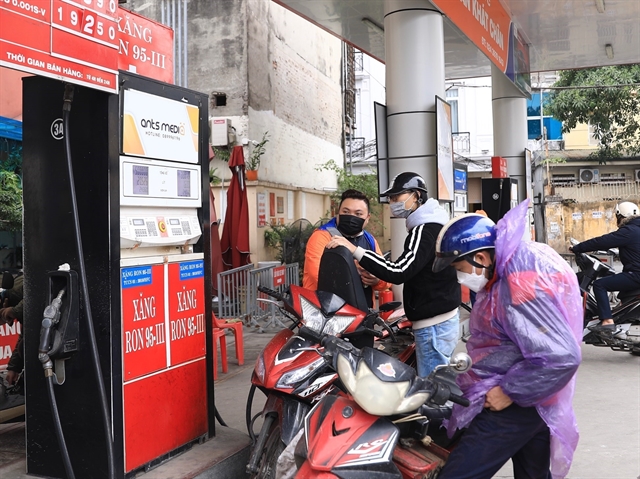 Economy
Economy

Deputy Prime Minister Lê Văn Thành has asked the Ministry of Industry and Trade (MoIT) to promptly conduct inspections to prevent illegal hoarding of petrol for profit.

|
| Customers filing up at a petrol station in Hà Nội. The Goverment has asked petroleum traders and distributors to ensure supply for domestic consumption. — VNA/VNS Photo |
HÀ NỘI — Deputy Prime Minister Lê Văn Thành has asked the Ministry of Industry and Trade (MoIT) to promptly conduct inspections to prevent illegal hoarding of petrol for profit.
The Deputy PM Thành made the request at a meeting to discuss petroleum production and supply for the domestic market on Tuesday.
At the meeting, MoIT Deputy Minister Đỗ Thắng Hải said domestic gasoline supply meet 75 per cent of market demand; the remaining 25 per cent comes from imports.
Fuel retailers belonging to large-scale petroleum trading companies account for 90 per cent of the local market share. Fuel sales have been maintained continuously since before the Lunar New Year.
However, an unusual phenomenon has been reported as some petrol stations have stopped selling gasoline, citing supply shortages, leading to inspections by the MoIT and market management forces.
It is reported that most petrol stations ceased sales because they take petroleum from small-scale petroleum traders and distributors. Some have intentionally limited their sales, waiting for an increase in retail prices.
Ministries, agencies and petrol traders have confirmed that the supply shortage has only occurred locally at some petrol stations, due to the practice of hoarding petrol for profit.
Hải said that the MoIT has enough legal tools and policies to ensure the supply of petrol, as is required under the regulation on compulsory gasoline reserve for the key petrol and oil traders.
Hải also said that the immediate problem of Nghi Sơn Refinery and Petrochemical Plant was removed, and starting in mid-February, the plant would gradually restore its production to as it was before.
Also at the meeting, Deputy PM Thành emphasised that gasoline is an important strategic reserve item that has a great impact on daily life and the national economy. Therefore, it must be well monitored and managed in a strict manner.
The country’s petroleum reserve is enough for market consumption. Việt Nam has conducted legal policies to stabilise and meet the local market consumption.
The MoIT was asked to be more proactive in serving local market demand and work out more specific and accurate plans to ensure strict control of the petroleum market.
It was requested that a balance between petroleum production and imports be reached.
The relevant ministries and agencies are required to carefully review the current mechanisms and policies, and any shortcomings found must be amended promptly.
The HCM City People’s Committee has worked with agencies, petrol traders and distributors to discuss petrol supplies in the city.
At their working session, businesses reported that the fluctuations of the world petroleum market and geopolitical tensions in some countries have had a great impact on the domestic petroleum market, as demand has been gradually rising recently. In addition, the Nghi Sơn Refinery has stopped importing crude oil.
Phan Thị Thắng, deputy chairwoman of HCM City People’s Committee, said the city would propose the Ministry of Industry and Trade and the Ministry of Finance to advise the Government on adjusting gasoline prices in special cases, so that businesses and major petroleum traders can take the initiative, while ensuring benefits for petroleum businesses.
Many private petrol stations in the Cửu Long (Mekong) Delta province of An Giang have run out of stocks and closed down temporarily, with some blaming it on hoarding by distributors who are waiting for the Government to increase prices.
An employee at Hướng Dương petrol station in Châu Phú District, Nguyễn Văn Bé, said they have been closed for two days due to a lack of supply.
Nguyễn Văn Việt, the owner of a petrol pump in Phú Tân District, said he had applied for permission from the local government to shut from February 5, because supply shortages have pushed wholesale prices up to the same levels as pump prices, causing him to lose money.
Nguyễn Ngọc Thới, director of An Kiên Private Enterprise, a distributor to petrol stations in An Giang Province, said the latter used to earn VNĐ200-1,000 per litre, but with supply scarce now and prices up, their profits have been wiped out.
He said with global petroleum prices increasing relentlessly, major suppliers are hoarding fuel and waiting for an upward price revision by the Government.
Trần Thanh Trung, deputy director of the An Giang Petroleum Company Limited (Petrolimex An Giang), said: “We only supply gasoline to our system and not to private gas stations because the supply is very limited.”
The situation has greatly affected businesses and transportation of people, especially as they start to return in huge numbers from the Mekong Delta region to HCM City and southern provinces to work and study after the Lunar New Year holidays. VNS